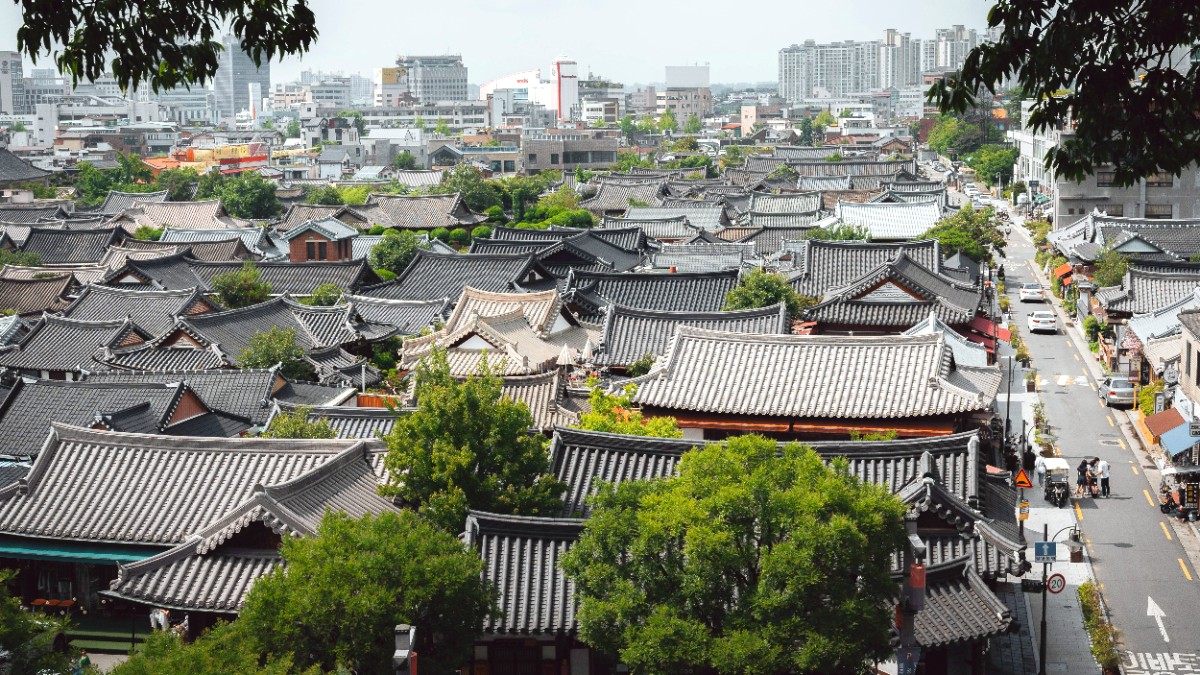
Jeollabuk Do, South Korea
Jeonju presents a rare chance to step back in time, immerse oneself in authentic traditional Korean culture. Unlike the rapid modernization seen in Seoul, Jeonju meticulously preserves its historical core.
Through its Hanok Village, historical sites, and traditional crafts, Jeonju aids in gaining an appreciation for Hanok architecture, intricate artisan skills, and Confucian philosophy.
Jeonju's slower, more reflective pace, compared to bustling Seoul, cultivates introspection and connection with the local environment and traditions. It aids in appreciating the beauty of preserving the past.
Jeonju's Hanok Village transports visitors to the Joseon Dynasty, offering a glimpse into historical Korean life, architecture, and daily routines from centuries past.
As an UNESCO City of Gastronomy, Jeonju presents a culinary adventure. From its famous Bibimbap to local street food and traditional makgeolli, the city is a feast for the senses.
Explore the legacy of Hanji paper, traditional fans, and other crafts at workshops and museums. Connect with Korea's artisan heritage and perhaps create your own piece of art.
As you leave Jeonju, carry forward a commitment to responsible travel. Your choices as a visitor have a direct impact on the places you explore.
Every traveler can contribute positively to Jeonju's future.
Your patronage of local shops, restaurants, and guesthouses directly boosts Jeonju's economy and its residents.
Support for local artisans and traditional craft makers helps keep ancient skills and heritage alive for future generations.
Choosing local businesses often leads to more authentic interactions and cultural insights than chain establishments.
Properly sort your waste and participate in South Korea's robust recycling system to minimize landfill contributions.
Be mindful of your water and energy consumption in accommodations. Turn off lights and air conditioning when not in use.
When visiting natural parks or areas, stay on designated paths and carry out all your trash, leaving no trace of your visit.
A few basic Korean phrases go a long way. Use "Annyeonghaseyo" (Hello) and "Gamsahamnida" (Thank you) to show respect.
Remove shoes when entering Hanok guesthouses and some traditional restaurants. Avoid loud conversations on public transport.
Be mindful of privacy. Ask permission before taking close-up photos of individuals, especially in cultural settings.
Engage with locals respectfully and openly, demonstrating genuine interest in their culture and way of life. Be mindful of privacy and avoid intrusive photography. Support the preservation of Jeonju's cultural heritage by adhering to rules at historical sites and contributing positively to the local atmosphere.
Jeonju serves as an excellent starting point or a meaningful stop in a broader South Korean itinerary.
Gyeongju: Known as "the museum without walls," the ancient capital of the Silla Kingdom. Filled with UNESCO World Heritage sites like Bulguksa Temple and royal tombs.
Seoul: The capital city is easily accessible by KTX from Jeonju. Explore diverse neighborhoods, modern skyscrapers, and nightlife.
Jeju Island: A volcanic island with stunning natural beauty, including volcanic craters, lava tubes, and beautiful coastlines. A UNESCO World Heritage Site.
Jeonju is an excellent hub for exploring the entire Jeolla region, which is renowned for its food, traditional culture, and natural beauty.
For foodies, Gwangju, another UNESCO City of Gastronomy in the Jeolla region, is known for its rich and diverse culinary scene, presenting a different flavor profile from Jeonju.
The Jeolla region itself offers a blend of serene natural beauty and historical significance, perfect for those who appreciate both.
Consider a multi-city pass if available for the region to optimize travel expenses.
Different seasons bring a new perspective to Jeonju's charm.
Return to Jeonju in autumn (late October/early November) to witness the stunning fall foliage at Moaksan Provincial Park or a day trip to Naejangsan National Park. The colors transform the landscape.
Plan a return visit during one of Jeonju's major festivals, like the Jeonju Bibimbap Festival (October) or the Jeonju Hanji Culture Festival (May), for a different cultural and celebratory experience.
Experience the quiet charm of the Hanok Village dusted with snow and enjoy the cozy warmth of Ondol heating, offering a tranquil and picturesque winter escape.
Extend your journey with themes that deepen your understanding of Korea.
Beyond Jeonju, explore other UNESCO Cities of Gastronomy or specific regional dishes across South Korea for a full gastronomic tour.
Engage in a temple stay experience at a monastery outside the city for a peaceful retreat and insight into Korean Buddhism.
Follow routes dedicated to traditional crafts, like pottery in Icheon or traditional liquor in various provinces.
Visit entertainment districts in Seoul like Gangnam or Hongdae for a taste of contemporary Korean pop culture.
Explore Korea's futuristic side with visits to tech museums or smart cities, showing cutting-edge advancements.
Discover contemporary art galleries and design studios, specifically in districts like Samcheongdong or Itaewon in Seoul.
Jeonju is a testament to South Korea's enduring spirit and rich heritage.
May your journey inspire future explorations of this captivating nation.